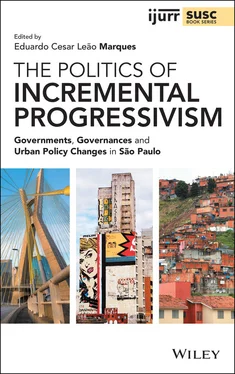96 Roy, A. (2016). Who’s afraid of postcolonial theory? International Journal of Urban and Regional Research 40 (1): 200–208.
97 Roy, A. and Al Sayyad, N. (eds.) (2004). Urban Informality: Transnational Perspectives from the Middle East, South Asia and Latin America. Lanham, MD: Lexington Books.
98 Ruchelman, L. (1969). Big City Mayors: The Crisis in Urban Politics. Bloomington: Indiana University Press.
99 Sabatier, P. and Jenkins‐Smith, H. (1993). Policy Change and Learning: An Advocacy Coalition Approach. Boulder, CO: Westview Press.
100 Santos, W. (1979). Cidadania e justiça. Rio de Janeiro: Ed. Campus.
101 Sapotichne, J., Jones, B., and Wolfe, M. (2007). Is urban politics a black hole? Analyzing the boundary between political science and urban politics. Urban Affairs Review 43: 76–92.
102 Scott, A. (2012). A World in Emergence: Cities and Regions in the 21st Century. Chelthenham: Edward Elgar.
103 Scott, A. and Storper, M. (2015). The nature of cities: the scope and limits of urban theory. International Journal of Urban and Regional Research 39 (1): 1–15.
104 SEADE. (2019). São Paulo 465 anos. São Paulo: Seade. http://www.seade.gov.br/wp‐content/uploads/2019/02/Municipio_Sao_Paulo_.pdf(accessed at 16 June 2020).
105 Sellers, J. (2010). State‐society relations beyond the Weberian state. In: Handbook of Governance (ed. M. Bevir), 124–141. London: Sage.
106 Sellers, J. (2019). From within to between nations: subnational comparison across borders. Perspectives on Politics 17 (1): 85–105.
107 Sellers, J. and Kwak, S. (2010). State and society in local governance: lessons from a multilevel comparison. International Journal of Urban and Regional Research 35 (3): 620–643.
108 Skocpol, T. (1992). Protecting Soldiers and Mothers: The Political Origins of Social Policy in the United States. Cambridge, MA: Belknap Press.
109 Stewart, F. (1950). A Half Century of Municipal Reform. the History of the National Municipal League. Berkeley: University of California Press.
110 Stoker, G. (1998). Governance as theory: five propositions. International Social Science Journal 50: 17–28.
111 Stokes, S., Dunning, T., Nazareno, M., and Brusco, V. (2013). Brokers, Voters, and Clientelism: The Puzzle of Distributive Politics. Cambridge: Cambridge University Press.
112 Stone, C. (1993). Urban regimes and the capacity to govern: a political economy approach. Journal of Urban Affairs 15 (1): 1–28.
113 Tendler, J. (1997). Good Government in the Tropics. Baltimore: Johns Hopkins University Press.
114 Tilly, C. (1992). Big Structures, Large Processes Huge Comparisons. New York: Russell Sage foundation.
115 Trounstine, J. (2009b). All politics is local: the reemergence of the study of city politics. Perspectives on Politics 7 (3): 611–618.
116 Ugalde, V. and Le Galès, P. (eds.) (2018). ¿Que se Gobierna? El caso de la ciudad de México. México, DF: Colegio de México.
117 Vivek, S. (2015). Delivering Public Services Effectively Tamil Nadu and beyond. Oxford: Oxford University Press.
118 Weitz‐Shapiro, R. (2014). Curbing Clientelism in Argentina: Politics, Poverty and Social Policy. Cambridge: Cambridge University Press.
119 Yates, D. (1977). The Ungovernable City: The Politics of Urban Problems and Policy Making. Cambridge, MA: MIT Press.
120 Zunino, H. (2006). Power relations in urban decision‐making: neo‐liberalism, “techno‐politicians” and authoritarian edevelopment in Santiago, Chile. Urban Studies 43 (10): 1825–1846.
1 1Demographic data relative to 2019 (Seade 2019) and all other data relative to 2018 ( infocidade.prefeitura.sp.gov.brand observasampa.prefeitura.sp.gov.br/gestao‐publica).
2 2 www.londoncouncils.gov.uk/node/31572and https://council.nyc.gov/budget/fy2016.
3 3 www.saopaulo.sp.leg.br/vereadores.
4 4The literature on service delivery, on the other hand, presents good accounts of the conditions under which services can be improved and delivered in Southern countries. However, these studies analyze national and regional transformations, indicators and processes in countries such as South Africa (Khosa 2000; McLennan and Munslow 2009; Palmer et al. 2017), India (Vivek 2015) and Brazil (Tendler 1997). This literature has illuminated several essential processes, but cities participate merely as scales of data aggregation, even in the case of indicators of their technical capacities.
5 5The comparative network involves colleagues from University College London, Sciences Po, Colegio de México and the University of Milano Bicocca, with Professors Patrick Le Galès, Mike Raco, Claire Colomb, Vicente Ugalde and Alberta Andreotti, Tommaso Vitale, among others.
6 6It is relevant to add Holland’s (2018b) arguments refining this hypothesis for young democracies with the so‐called truncated welfare states in Latin America. The author sustains that when welfare policies mainly and continuously benefit the middle classes and the rich more than the poor, the political calculus of each of these groups happens differently. The rich, and not the poor, would favor redistribution, changing the support for welfare state formation and political parties. The argument is compelling but seems more appropriate to Brazil before the 1990s when the so‐called regulated citizenship (Santos 1979) was still central. Since then, many expansions of rights and policies have taken place, regardless of all the problems they still present (Arretche 2018). Therefore, it is the poor that recognize themselves in social policies in contemporary Brazil, as some studies have been showing (Arretche et al. 2016).
7 7Despite a large number of political parties in Brazil, classifying them (and governments) within an ideological continuum is not tricky. We follow widely used classifications produced from party behavior in Congress. These are also consistent with surveys among politicians about substantive positions (Figueiredo and Limongi 1999).
8 8This distinction can also be read using Lowi's (1972) classical definition, with all governments producing distributive policies (that apparently benefit all, and thus have low political costs), but just left‐wing governments producing redistributive policies (that clearly benefit some at the expense of others).
9 9Like many other processes, policy resilience is also influenced by actors and processes located at other levels, as we discuss later.
10 10 Table I.2, at the end of the introduction documents the information, already advancing details covered by the chapters.
11 11To calculate the incidences cited here, we coded the information per policy and government into three different tables. All cells were initially coded 0 but were altered to 1 if that government: had initiated or reinitiated that policy considering all implementation intensities; considering only medium and robust implementation; as well as whether the program merely existed (with any intensity) during that government. For restarts from latency we considered as one both reinitiating with any intensity or jumping two points in implementation, from weak to strong. The coded information allowed the calculation of distributions by ideological blocks and the cited statistical tests.
12 12All these differences between the left and any other block (or combination) were significant at 95% in tests of average difference.
13 13Higher averages for the left continued to be significant at 95% compared to the center‐right, right or both.
14 14Considering all stops, additionally to reductions of intensity from strong or medium to weak implementation.
15 15The cross‐tabulation between trajectories and types of redistribution is significant at 95% considering several statistical tests and measures.
Читать дальше












